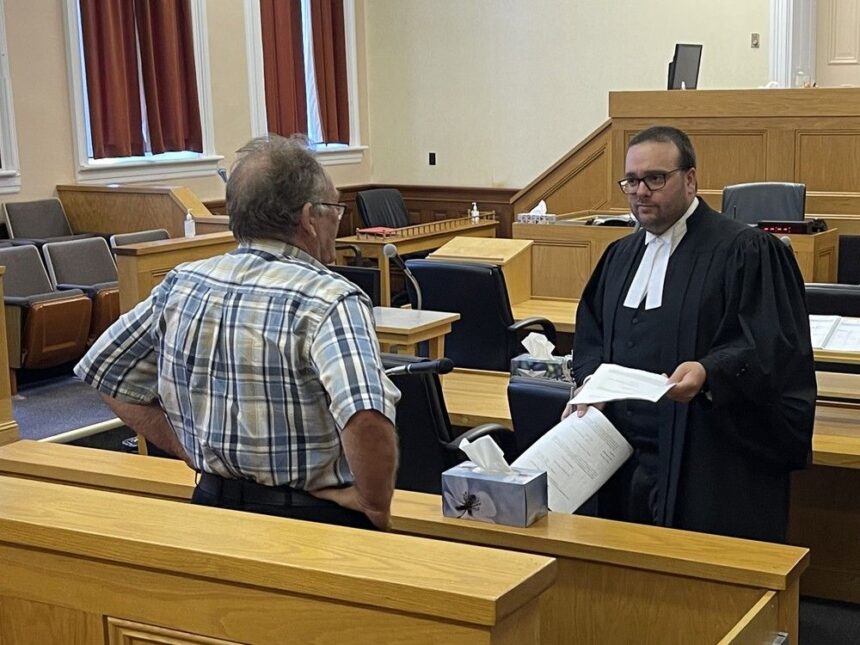Defence lawyer Robert Hoskins (right) speaks with his client, Robert Layman, following Justice Philip Osborne’s decision Tuesday, Aug. 5, to allow the Crown to use the complainant’s testimony from three years ago at Layman’s sexual assault retrial. The defence had opposed the application. – Photo by Tara Bradbury/The TelegramArticle contentThe retrial of a St. John’s taxi driver charged with sexual assault will continue without the complainant having to testify again after the court granted a request from the Crown to use her testimony from 2022 as evidence instead of calling her back.Newfoundland and Labrador Supreme Court Justice Philip Osborne ruled Tuesday, August 5, to allow prosecutors to use the woman’s testimony from Robert Layman’s previous trial as evidence, finding she is too unwell to continue testifying this time around.“If the complainant felt able to continue to testify, the court would continue to accommodate her. However, based on the evidence of (her doctor) and the experiences of the complainant’s evidence in court, I have no difficulty finding she is too ill to testify,” the judge said.THIS CONTENT IS RESERVED FOR SUBSCRIBERS ONLY.Subscribe now to access this story and more:Unlimited access to the website and appExclusive access to premium content, newsletters and podcastsFull access to the e-Edition app, an electronic replica of the print edition that you can share, download and comment onEnjoy insights and behind-the-scenes analysis from our award-winning journalistsSupport local journalists and the next generation of journalistsSUBSCRIBE TO UNLOCK MORE ARTICLES.Subscribe or sign in to your account to continue your reading experience.Unlimited access to the website and appExclusive access to premium content, newsletters and podcastsFull access to the e-Edition app, an electronic replica of the print edition that you can share, download and comment onEnjoy insights and behind-the-scenes analysis from our award-winning journalistsSupport local journalists and the next generation of journalistsRegister to unlock more articles.Create an account or sign in to continue your reading experience.Access additional stories every monthShare your thoughts and join the conversation in our commenting communityGet email updates from your favourite authorsSign In or Create an AccountorArticle contentArticle contentLayman, now 76, was found not guilty at trial three years ago of sexually assaulting the woman in 2017, after driving her home from the hospital.The province’s Court of Appeal later overturned the acquittal and ordered a new trial, which began in Supreme Court in St. John’s in March.Courtroom accommodations unsuccessfulArticle contentArticle contentThe complainant, who is in her 30s, has a medical condition affecting her mobility, speech and vision, and used a laptop to type her testimony during the first trial.Before the new trial started, the defence raised concerns about the woman using that method again, noting the court could see her responses as she typed, including anything she deleted or revised.The court eventually settled on a plan where the complainant would text her answers on her cellphone, with a Victim Services worker present to monitor her typing.The approach worked during a test run, and the trial began.Once proceedings were underway, however, the complainant had increasing difficulty texting her responses, sometimes taking up to 30 minutes per question. At one point, she inadvertently pasted part of a previous answer and sent an unrelated photo.After an adjustment to the process, the court was told before proceedings resumed that the woman no longer wanted to testify.That’s when prosecutor Katie Philpott argued for permission to use the complainant’s previous testimony as evidence instead, saying the woman’s condition has deteriorated to the point that she is now unable to effectively communicate through any available device.Article contentArticle contentArticle contentArticle contentArticle contentTestifying challenging but not impossible, defence arguesThe law allows the court to accept prior testimony in specific cases — including when a witness has died, is no longer in Canada, or is so ill that they are unable to travel or testify — unless the defence can prove it did not have a full opportunity to cross-examine the witness.Defence lawyer Robert Hoskins argued against the application, saying there’s no evidence to determine why the woman no longer wants to testify.Her neurologist had told the court it would be difficult for her to testify, but not impossible.Hoskins pointed out that testifying is a challenging and uncomfortable process for most complainants in a sexual assault trial. The judge acknowledged that argument and agreed that a witness simply wanting to avoid testifying can’t be the threshold to accept this type of application.However, this is not that kind of situation, Osborne added, finding the complainant had not been a reluctant witness until now, and issuing a warrant compelling her to testify wouldn’t alleviate the communication difficulties at trial.Article contentArticle contentThe judge also rejected Hoskins’ argument that Layman’s defence will fail without his ability to cross-examine the woman on the issue that had led to the new trial: DNA transfer.
St. John’s cabbie’s sexual assault retrial will continue without new testimony from complainant











